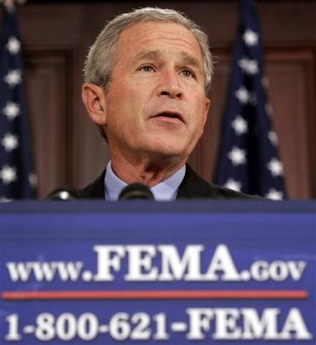|
Bush approves $51.8B for Hurricane relief
(AP)
Updated: 2005-09-09 20:34
President Bush vowed to stand by evacuees displaced by Hurricane Katrina "for the long haul" and warned lawmakers, who have already poured more than $62 billion into the devastated Gulf Coast, that they'll need to spend even more.

President Bush speaks in the Eisenhower Executive Office Building, Thursday, Sept. 8, 2005. Bush, under fire for the government's response to the devastation from Hurricane Katrina, announced initiatives aimed at helping people 'get back on their feet.' [AP] |
Congress rapidly and overwhelmingly voted Thursday to fulfill an urgent plea for $51.8 billion, adding to $10.5 billion that was approved last week for hurricane victims. After signing the bill, Bush said, "We will continue to help people rebuild their lives and rebuild the region."
Thursday's action made $2,000 available to each family displaced by the storm. Bush vowed to cut through red tape hampering victims from claiming federal medical, food and housing benefits, as government officials worked to issue the $2,000 debit cards to some evacuees and clear up confusion about claiming the money.
"We have much more work to do, but the people who have been hurt by this storm need to know that the government is going to be with you for the long haul," Bush said.
Sen. David Vitter, R-La., called the debit cards "a good start" on Friday but said evacuees will need a lot more money.
"We need to be able to get them the cash they need to be able to live and survive, even in the near term, because many of these folks live paycheck to paycheck," Vitter told CBS' "The Early Show."
The president designated Sept. 16 as a national day of prayer and remembrance for Katrina's victims.
Promises for sustained federal help came amid heightening strain and signs that the road to recovery will be long.
Police prepared to evacuate residents reluctant to leave their homes. Much of New Orleans remained flooded and those who stayed behind lack power, water and food. Fires burned across the city.
Vice President Dick Cheney toured the region and described "significant" progress while acknowledging a lot more work needs to be done. It's too soon to estimate the total cost of reconstruction from Katrina, he said.
Environmental Protection Agency Administrator Stephen Johnson said the difficult decision to pump heavily contaminated floodwaters into Lake Pontchartrain could pose new environmental problems in future years.
Describing the watery soup that has engulfed New Orleans, Johnson said: "This water is very unsafe. It's a health hazard."
Bush used national emergency authority to waive sections of a federal law that requires payment of prevailing wages on government contracts, wages based on surveys that take into account union and nonunion pay. The waiver applies to disaster areas in Louisiana, Mississippi, Alabama and Florida.
Democrats immediately urged Bush to rescind the order. "Hurricane Katrina took away their jobs, now President Bush will take away their wages when they find new jobs," said House Minority Leader Nancy Pelosi, D-Calif.
Democrats also questioned the wisdom of funneling $50 billion in recovery funds through the Federal Emergency Management Agency with questions swirling about whether it acted too slowly to help hurricane victims.
"After what we all have witnessed the past week or so, is there anyone in America who feels we should continue to rely exclusively on FEMA to head the federal government's response to this tragedy?" asked Senate Minority Leader Harry Reid, D-Nev.
Congressional Democratic leaders said they would refuse to appoint members to a committee that Republican leaders intend to create to investigate FEMA and the administration's response to the storm. Democratic criticism intensified.
"When the storm hit and the levees broke, our calls went unanswered," Sen. Mary Landrieu (news, bio, voting record), D-La., said on her first day back from the Gulf Coast.
"I intend to find out why the federal response, particularly the response of FEMA, was so incompetent and insulting to the people of our states."
And some lawmakers started to sound alarms about the growing cost of recovery.
Sen. Tom Coburn, R-Okla., said federal spending should be re-examined and some programs cut while the Gulf Coast remains a priority.
"We're going to do the easy thing. We should pay for this," Coburn said. "We should pass this bill, but we should not pass it on the backs of our children and grandchildren."
Others cautioned against new authority that temporarily increases the purchasing limit from $15,000 to $250,000 for federal employees with government-issued credit cards working on recovery, arguing that it could lead to wasteful spending.
|